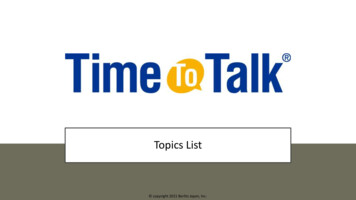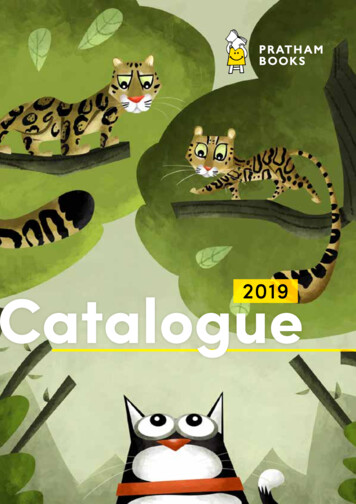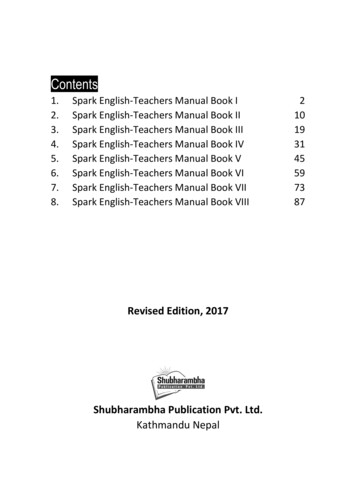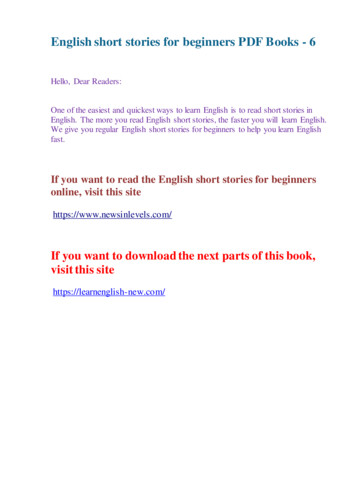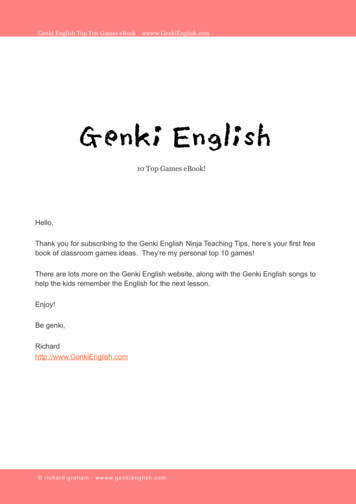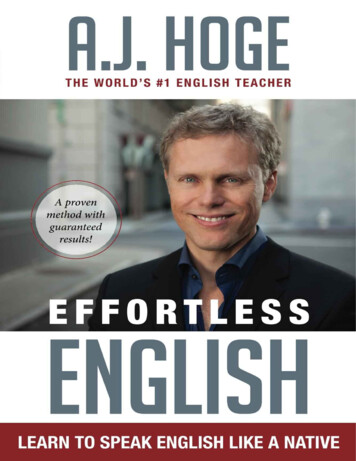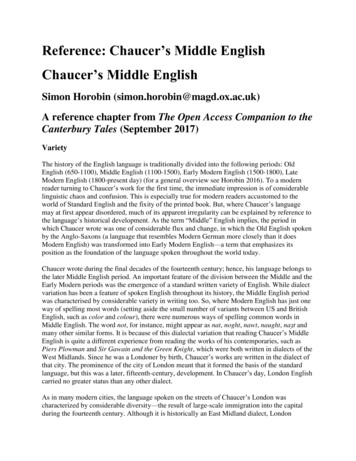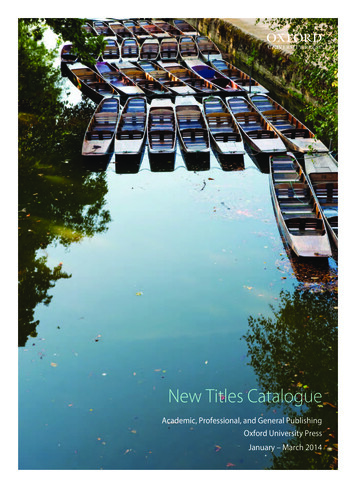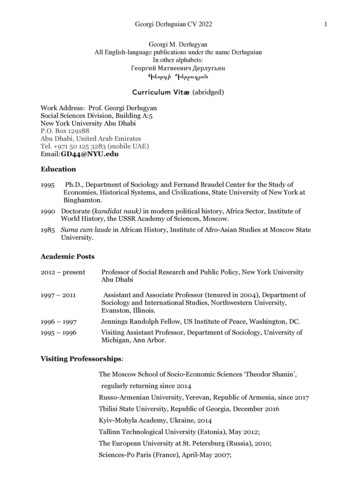
Transcription
Georgi Derluguian CV 2022Georgi M. DerlugyanAll English-language publications under the name DerluguianIn other alphabets:Георгий Матвеевич ДерлугьянԳեորգի ԴերլուգյանCurriculum Vitæ (abridged)Work Address: Prof. Georgi DerlugyanSocial Sciences Division, Building A:5New York University Abu DhabiP.O. Box 129188Abu Dhabi, United Arab EmiratesTel. 971 50 125 3283 (mobile UAE)Email:GD44@NYU.eduEducation1995Ph.D., Department of Sociology and Fernand Braudel Center for the Study ofEconomies, Historical Systems, and Civilizations, State University of New York atBinghamton.1990 Doctorate (kandidat nauk) in modern political history, Africa Sector, Institute ofWorld History, the USSR Academy of Sciences, Moscow.1985 Suma cum laude in African History, Institute of Afro-Asian Studies at Moscow StateUniversity.Academic Posts2012 – presentProfessor of Social Research and Public Policy, New York UniversityAbu Dhabi1997 – 2011Assistant and Associate Professor (tenured in 2004), Department ofSociology and International Studies, Northwestern University,Evanston, Illinois.1996 – 1997Jennings Randolph Fellow, US Institute of Peace, Washington, DC.1995 – 1996Visiting Assistant Professor, Department of Sociology, University ofMichigan, Ann Arbor.Visiting Professorships:The Moscow School of Socio-Economic Sciences ‘Theodor Shanin’,regularly returning since 2014Russo-Armenian University, Yerevan, Republic of Armenia, since 2017Tbilisi State University, Republic of Georgia, December 2016Kyiv-Mohyla Academy, Ukraine, 2014Tallinn Technological University (Estonia), May 2012;The European University at St. Petersburg (Russia), 2010;Sciences-Po Paris (France), April-May 2007;1
Georgi Derluguian CV 2022Université de Bordeaux (France), March 2007;University of Bergen (Norway), Spring 2006.Meiji Gakuin University, Yokohama (Japan) October 1996Honors and Fellowships2021, SpringSaadiyat Senior Fellow, Abu Dhabi2020, October 30 Keynote address, Marshal Ogarkov Memorial Conference, Moscow2018, May Senior Fellow, Institut für die Wissenschaften vom Menschen, Vienna, Austria2017Kondratieff Medal in historical political economy; Nikolai KondratieffInternational Memorial Society2017, OctoberKeynote speaker at Aleksanteri Institute annual conference, University ofHelsinki, Finland2017, OctoberKeynote speaker, Dialogue of Civilization Forum, Berlin, Germany2017, September Honorary Research Professor, Russo-Armenian University, Yerevan,Republic of Armenia2017 June2016, March2015, 2016Social Science Advisor to the Parliament of Mountainous KarabaghRepublicKeynote speaker ‘The World-Systems of Ibn Battuta’, La Fontaine Forum,Manama, Kingdom of BahrainSenior consulting professor to National Defense College, Abu Dhabi,Ministry of Defense, United Arab Emirates2014/2015 Senior Adviser for Faculty Development; Open Society Institute, Budapest,Hungary2014Senior Project Consultant and Faculty Mentor in Georgia and Armenia, AcademicSwiss Caucasus Net; University of Fribourg and Gebert Rüf Stiftung(Switzerland)2014, July Keynote address to the Council of Ministers, Russian Federation2013Consulting Professor (Honorary), Russian Presidential Academy of NationalEconomy and Public Administration, Moscow2013Woodrow Wilson Scholar, Washington, DC2013 Honorary Professor, University of Kabardino-Balkaria (Republic of KabardinoBalkaria, Russian Federation); member of Trustees Board since 20152012 (January) Policy Expert, Institut für die Wissenschaften vom Menschen, Vienna,Austria2
Georgi Derluguian CV 20222011/122010Faculty Development Adviser, Academic Fellowship Program, Open SocietyInstitute, New York and Budapest.National Book Award ‘Social Thought’, Russia2010, 2008, 2005 The Faculty Honor Roll awarded by the Associated StudentGovernment, Northwestern University2009Senior Fellow, Wissenschaftskolleg zu Berlin, Germany (deferred)2009Fulbright Senior Specialist2008Presidential Fellow, Social Science Research Council2007Norbert Elias Prize, the Netherlands2007Best monograph award, Section on the Political Economy of World System,American Sociological Association2006Books of the Year, Times Literary Supplement (England, 1 December 2006)2006Honorable Book Mention, Political Sociology Section, AmericanSociological Association2003Searle Research Award2001Carnegie Scholar of Vision, the Carnegie Corporation of New York2000IREX travel and field research grant1998 – 1999Research grant from the National Council for Eastern Europe andEurasia Research (NCEEER) to evaluate the globalization of post-Sovietcriminal underworld1998The Northwestern alumnæ grant for curriculum development1996 – 1997Jennings Randolph Senior Fellowship, US Institute of Peace1995 – 1996Sawyer Fellow, Advanced Study Center. University of Michigan,1993 – 1996The SSRC—MacArthur Fellowship on Peace and Security.College courses on a regular offer:State Formation in the Modern Middle East and UAEGlobal News AnalysisOilProfessional Service:Board member, the Caucasus Institute, Yerevan – Geneva (since 2017)Trustee, University of Kabardino–Balkaria (since 2015);Contemporary Sociology, Editorial Board Member since 2007-2012;Prognozis, Editorial Board Member, 2006 - 2011Committee Member, Section on the Political Economy of World-Systems(PEWS), American Sociological Association, 2010 – present3
Georgi Derluguian CV 2022Languages: Russian (native), English and Portuguese (fluent); French, Spanish, Ukrainian(proficient); Armenian (daily-life only); Swahili (rusty)BOOKS:STALIN: A Short Excursus. Manuscript, together with Syephen Kotnin (in Russian)ELEMENTAL POWERS: CHIEFTAINCY LEADERSHIP FROM PALEOLITHIC TRIBES TOGLOBAL CORPORATIONS, a book manuscript in progress, with Timothy Earle andWilliam RenoARMENIA: ANALIZ VOZMOZHNOSTEI (Armenia: Analyzing the Possibilities), Moscow:Dmitry Pozharsky University Press, 2017 (in Russian and Armenian).SOTSIALNI TA POLITICHNI KONFIGURATSII MODERNU: DINAMIKA VLADY VUKRAINI TA SVITI. (The social and political configurations of modernity: the dynamics ofpower in Ukraine and the world). The Fourth International Sociological Conference. Coedited with Pavlo Kutuev. Kyiv: Polytechnic Institute, 2015 (in Ukrainian, Russian, andEnglish)DOES CAPITALISM HAVE A FUTURE? With Immanuel Wallerstein, Randall Collins,Michael Mann, and Craig Calhoun. Oxford University Press, 2013.Translations:Arabic — Beirut: Arab Science Publishers, 2016Chinese — Zi ben zhu yi you wei lai ma? Beijing: Social Sciences Academic Press, 2014.Czech— Má kapitalismus budoucnost? Prague: Sociologické Nakladatelství SLON, 2016Farsi — Tehran: Pejvak Publications, forthcoming.Finnish — Onko kapitalismilla tulevaisuutta? Helsinki: Gaudeamus, 2014French — Le capitalisme a-t-il un avenir ? Paris: La Découverte, 2014.German — Stirbt der Kapitalismus. Frankfurt am Main: Campus Verlag, 2014Korean — Jabonjuineun miraega inneunga? Seoul: Changbi, 2014.Polish — Czy kapitalizm ma przyszłość? Warsaw: Wydawnictwo Akademickie DIALOG,2015Portuguese — São Paulo (Brazil): Boitempo Editorail, forthcomingRussian — Есть ли будущее у капитализма? Moscow: Gaidar Institute, 2015Romanian — Are Capitalismul un Viitor? Bucureşti, România: COMMUNICARE.RO, 2016Slovenian — Ali ima kapitalizem prihodnost? Ljubljana: Založba /cf, 2013Spanish —¿Tiene Futuro el Capitalismo? Siglo XXI, México, 2016Turkish: — Kapitalizmin Geleceği Var mı? Istanbul: M e t i s Y a y ı n c ı l ı k , 2014Urdu — under negotiationTHE WAY THIS WORLD-SYSTEM WORKS (KAK USTROEN ETOT MIR). A book of essays,in Russian. Moscow: Gaidar Institute, 2013. In the fifth edition now; ‘Top Ten IntellectualBestsellers’ of 2013 in the list of the Falanster Booksellers. Georgian and Ukrainiantranslations in preparationPOSSIBLE FUTURES, co-edited with Craig Calhoun (36 contributors, in 3 volumes), NewYork: SSRC and NYU Press, 2011Vol. I Business As Usual: The Roots of the Global Financial Meltdown.vol. II. Deepening Crisis: Governance Challenges after Neoliberalism.vol. III Aftermath: A New Global Economic Order?BOURDIEU’S SECRET ADMIRER IN THE CAUCASUS: A WORLD-SYSTEMSBIOGRAPHY. University of Chicago Press, 2005. The Russian version, substantially4
Georgi Derluguian CV 2022revised: ADEPT BURDIE NA KAVKAZE: BIOGRAFIA V MIRO–SISTEMNOIPERSPEKTIVE. Moscow: “Territoria buduschego”, 2010. The renewed Russian edition is inpreparation. French and Polish translations in preparation.QUESTIONING GEOPOLITICS: POLITICAL PROJECTS AND THE SHIFTING PATTERNSOF WORLD-SYSTEM. Westport: Praeger, 2000 (Co-edited with Scott L. Greer).Scholarly articles, working papers, book chapters:“The Post-Soviet Revolution in Armenia: Victory, Defeat, and Possible Future.” Ch. 35 in: JackGoldstone, Leonid Grinin, Andrey Korotayev (Editors) Handbook of Revolutions in the 21stCentury: The New Waves of Revolutions, and the Causes and Effects of Disruptive Political Change.ISBN: 3030864677 Springer, 2022“The Generation of Unfinished Future”, in: Re-reading Boris Pankin. (in zavershennogo-budushhego/“A Conflict of Regional Importance?” pp. 7-19 in: Ruslan Pukhov (ed.) A Storm over theCaucasus. Moscow: Center for the Analysis of Strategy and Technology, 2021 (in “Forging a Unitary State: Russia's Management of the Eurasian Space, 1650-1850” by JohnLeDonne (book review). Canadian-American Slavic Studies 55 (2021) article-p169 6.xml“A Small World War”, New Left Review, pp. 24-46, II/128, March-April s/georgi-derluguian-a-small-world-war“The Asia’s Awakening-2: Imperialism in the Twenty-first century”, Russia in GlobalAffairs, March 2021 (in Russian and English) /“Four Time Horizons Facing Armenia After the Second Karabagh War: A month, one year, 5and 25 years”, Aravot November 2021 (in Russian and Armenian)“The Mirrors of Eastern Europe”, introduction article to the volume: Dmitry Okrest andRoman Poroshin (eds.) Eastern Europe, 1980s–1990s. (in Russian)“What is the Caucasus”, in: Crispin Brooks and Kiril Federman (editors), BEYOND THE PALE:THE HOLOCAUST IN THE NORTH CAUCASUS. Rochester. NY: Rochester University Press, 2020.“The Caucasus: A Rock in the Grinding Wheels of World History”, Caucasology, N2/2020, pp.12-49 (in Russian)Review of: Vasabjit Banerjee, Undoing the Revolution: Comparing Elite Subversion of PeasantRebellions. Contemporary Sociology, Volume: 49 issue: 5, page(s): 425-426“The Islamic Worlds of Welfare” (Review article) British Journal of Sociology, Vol. 70, issue1, pp. 395-408. Online preprint: https://doi.org/10.1111/1468-4446.126085
Georgi Derluguian CV 2022“Postmodernity’s Unexpected Arrival: 1968 as Breakdown in Geoculture”, Slavic Review,Volume 77 Number 4, pp. s/77index.html# Number 4, Winter“The Armenian Anomaly: A Historical Sociological Interpretation” Demokratizatsiya: TheJournal of Post-Soviet Democratization, 26:4 (Fall 2018), pp. 441-464. (Conclusions prepublished online on CivilNet anAnomaly/343288)“The Soviet Revolution and the Social Evolution of Humankind”, Sociology: Theory,Methods, Marketing. N0. 2, 2018 (in Russian and Ukrainian)Enter Nikol Pashinyan: The Causes and Future Prospects of the 2018 ArmenianRevolution. Washington, DC: PONARS-Eurasia Policy Memo 542. October -revolution“The reader’s biography of historical sociologist Georgi Derluguian”. Interview with Nik.Protsenko. Gorky Review of Books. (in Russian) Part I: 4 September aya-zhe-zanudnaya-beliberda-majnkampf-gitlera/ Part II: 6 September 2018 -sssr/Review of Giacomo Corneo, “Is Capitalism Obsolete? A Journey through AlternativeEconomic Systems.” The Journal of World-Systems Research, Vol. 24, No. 2 (Summer2018) w/73“Mozambique in the 1980s: Periphery Goes Postmodern”, in: Eric MORIER-GENOUD,Michel CAHEN & Domingos Manuel DO ROSÁRIO (eds.) Provincial Wars? The LocalDynamics of the Civil War in Mozambique, 1976-1992. London: James Currey Publishers,2018“Why? Making Sense of Chechnya Violence”, pp. 53 – 60 in: Anders Kreuger (ed.)Keicheyuhea: The Dark Art of Aslan Gaisumov. Berlin: Sternberg Press, 2018“What Happened to the USSR, After All?” afterword to Stephen Kotkin’s ArmageddonAverted. (Predotvrashchennyi Armageddon). Saint Petersburg, Russia: NZ Publishers, 2018(in Russian)“1968, the Apex of Modernity Project”, Neprikosnovennyi zapas, October 2018(forthcoming, in Russian)“Inequality in the Evolution of Human Societies”, Special report to the Dialogue olution-human-societies/“Could the world-systems theory inform literary theory?” Novoe literaturnoe obozrenie(NLO), Spring 2018 (in Russian)“The History and Prospects of Russian Liberal Opposition”, interview to the GeorgianJournal of Systemic Politics, inaugural issue (forthcoming)“The Arch-anti-neo-marxist, or Weber today”, Introduction to Michael Mann’s Sources ofSocial Power, 4 vols. Vol. 1, pp. 3 –21, Moscow: Delo, 2018 (in Russian)6
Georgi Derluguian CV 2022“The Soviet Revolution, 1905-1945: Theses on the First Centenary”, Neprikosnovennyizapas (NZ), 2017, N 6, pp. 60 – 80 (in Russian) The Ukrainian evolyuciya/“Straying from the Party Line: Last Years in the USSR” Jacobin, Fall 2017 (special om-the-party-line“Gaidar Forum 2017: Global Transformation in the Context of Historical Sociology”. WithWolfgang Streeck, Ho-Fung Hung, Mishaal Al-Gergawi, and Monica Prasad. PolicyTrajectories: Blog of American Sociological Association’s Section on Comparative andHistorical Sociology, February 2017 ion-in-the-context-of-historicalsociology/“After the Post-Soviet Restaurations: An Analysis of the Range of Possibilities”,Neprikosnovennyi zapas (NZ), 2017, NN 1-2 (in Russian)“Does Capitalism Have a Future? That Is the Research Question.” Cliodynamics: TheJournal of Quantitative History and Cultural Evolution, 7 (1:2016), pp. The post-Soviet industrial extinctions and the rise of jihadi terrorism as male gender role inthe North Caucasus”, Ch. 39. Pp. 729-37 in: Elgar Handbook of Alternative Theories ofEconomic Development, edited by Jayati Ghosh, Rainer Kattel, and Erik Reinert. London:Elgar, 2016“Taming the chief: from evolutionary theory to political ideology”, ch. 4, pp. 62-86 in:Global powers: Michal Mann’s anatomy of the twentieth century and beyond. Ed. by RalphSchroeder. Cambridge University Press, 2016“The Masters of New Life?” Foreword to Elites and ‘Elites’ in Post-Soviet Armenia andGeorgia, Yulia Antonian (ed.) Yerevan, 2016“Missing the China Exit: A World-systems Perspective on the Ukrainian State”, Ch. 11 (pp.204-218) in: Henry Hale and Robert Orttung (eds.) Beyond the Euromaidan: ComparativePerspectives on Reform in Ukraine Stanford University Press, 2016"Islamism in the Newest Round of Imperial Collapse" pp. 357-72 in: STATE, RELIGION,AND CHURCH, No. 2 (34) 2016, (in Russian) http://igsu.ranepa.ru/news/p27443/“Spaces, Trajectories, Maps: Towards a World-System Biography of ImmanuelWallerstein”, Journal of World-Systems Research, Vol 21, No 2 (2015) pp. 448-459“Fuel Protests in Armenia: A Field Study of Social Movements” (with Zhanna Andreasyan),New Left Review 95 (Sept – Oct 2015), pp. 29-48."De Iván el Terrible a Vladimir Putin: Rusia en la perspectiva del sistema-mundo" NuevaSociedad 253 (Septiembre - Octubre 2014), Buenos Aires co-authored with ImmanuelWallerstein. Under translation into Chinese. An updated and abridged version appeared in:Revista de Libros, N 3 (Julio-Agosto) 2015, Montevideo, Uruguay7
Georgi Derluguian CV 2022“Did Armenia just have an Orange Revolution?” (with Zhanna Andreasyan). Monkey Cage(Washington Post), July 24, 2015 tion/“World-Systems Analysis: An Annotated Guide”, with Kevan Harris, in: Jeff Manza (ed.)Political Sociology. Oxford Bibliographies Online (invitation-only, peer reviewed resource).New York: Oxford University Press, 2015. Updated edition e/sociology“Cultural Life in Krasnodar in the Twentieth Century: What Makes Provincial TownProvincial? (Review of A.N. Eremeeva).” Russian Review, Vol. 73, No. 1“Giovanni Arrighi”, pp. 39-40 in: Istoriya politiychnoï dumky: entsyklopedychnyï slovnykdovidnyk [Entry on “Giovanni Arrighi” in the Encyclopaedic dictionary–handbook ofpolitical thought], Lviv: Vydavnytstvo “Novyï Svit”, 2014, translated into Ukrainian by L.Ugrin“Making and Breaking the Political Machine in Kabardino-Balkaria, 1921 — 2013”, withSufian Zhemukhov, Demokratizatsiya, vol. 21 No 4 (Fall 2013) pp. 531 – 557“Ethnic Conflict in Micro- and Macro-Level Theories” Review, Modern Greek StudiesYearbook: A Publication of Mediterranean, Slavic, and Eastern Orthodox Studies Vol.28/29 (2012/2013), University of Minnesota Press, 2013.“Convergence-2, or the Fate of Other Superpower”. Political Power and Social Theory, Vol.26, 237- 259“The Jigit Dilemma: Masculinity, Ex-developmental State, and Terrorism in the NorthCaucasus”, The Sources of Violence in Eurasia, Stockholm International Peace ResearchInstitute (SIPRI) Policy Briefs.“Dmitry Furman: In the League of His Own”, pp. I – XXII, Introduction to Dmitry E.Furman, Comparative Sociology of World Religions. Moscow: Terriroia Buduschego, 2012.(In Russian)“What Can a Sociologist Meaningfully Say About Violence: The Counter-Theses.” Logos 3(87) December 2012: 3 – 9 (in Russian)“Does Globalization Breed Ethnic Violence?” in: Zeynep Gambetti and Marcial Godoy (eds.)States of (In)security. New York: NYU Press, 2013“The Social Origins of Good Governance: Reinterpreting the 1968 Crisis in Frente daLibertação de Moçambique (FRELIMO)” pp. 79 – 102 in: Eric Morier-Genoud (ed.) SureRoad? Nationalisms in Angola, Guinea-Bissau and Mozambique. Leiden: Brill, 2012.“Let Our Fame Be Great! (Nationalist Defiance and Myth-Making in the Caucasus.)”Russian Review (2011) 70: 2, 337-338“Stanitsa: An Ethnography of Capitalism in the Cossack Village (book project)”, PONARSEurasia Policy Memos Series e-lifeof-the-north-caucasus/8
Georgi Derluguian CV 2022“The Recurrence of ‘Sovereign Bureaucracy’ in Russian Modernizations”, in: PiotrDutkiewicz and Dmitry Trenin (eds.) Russia. The Challenges of Transformation. New York:NYU Press, 2011.“Strong chieftaincies out of weak states, or elemental power unbound”, with Timothy Earle,Comparative Social Research Vol. 27 (May 2010), pp 51 - 76“Putting Russia in World-System Perspective”, co-authored with Immanuel Wallerstein, in:Nikolai Petrov (ed.) Russia in 2020. Washington, D.C.: Carnegie Endowment for Peace,2011.“Chechnya: A Brief Explanation”, pp. 281 – 292 in Adele Marie Barker and Bruce Grant(eds.) The Russia Reader: History, Culture, Politics. Durham: Duke University Press, 2010.“Recoil to Periphery”, in: Possible Futures. Vol. III The Prospects of World Development.Co-edited with Craig Calhoun. NYU Press, 2011.“Migration, Homeland, and Belonging in Eurasia” Contemporary Sociology (2009) 38: 5,410-412 with Karen MüthThe Colored Revolutions Betrayed. Washington, DC: George Washington University,PONARS Eurasia Policy Memo No. 100 2010, s/policy-memos-pdf/pepm 100.pdf“Della Rivoluzione alla Guerra”. In: Cecenia. Una Guerra e una Pacificazione Violenta.Torino: Museo Diffuso della Resistenza della Deportazione della Guerra dei Diritti e dellaLibertà, 2008 (in Italian).“Sketch for a Self-Analysis: Pierre Bourdieu in the Context of French and World Sociology”,Contemporary Sociology (2009) 39: 5, 463-465, with Karen Müth.The Evolution of Russo-Georgian Stereotypes. Washington, DC: Georgetown University,PONARS Eurasia Policy Memo No. 40 2008, /policy-memos-pdf/pepm 040.pdf“The Forgotten Complexities of Jihad in the North Caucasus”, in: Lale Yalcin-Heckmannand Bruce Grant (eds.) Caucasus Paradigms: Anthropologies, Histories, and the Makingof a World Area [Halle Studies in the Anthropology of Eurasia]. Münster: LIT Verlag,2008.“The Trajectories of Gunpowder Empires on Europe’s Periphery, 1453-2000”, SocialEvolution & History Vol. VI, no. 1 (March 2007)“The Worlds which the Portuguese, the Russians, and the Turks Created: Empires onEurope’s Periphery”, Lusotopie. Recheres politiques internationals sur les espaces issusde l’histoire et de la colonization portugaises. Vol. XIV (2), Novembre 2007."A Cyclical Theory of Russia's Historical Change", pp. 45-60 in the volume edited by CarlosCanales, Lilly A. Lo Manto, and Sergei Plekhanov, Russie: Le défi d'une metamorphose.Toronto: York University Press, 2004.“Whose Truth?” Introduction to Anna Politkovskaia, A Small Corner of Hell: Reports fromChechnya. Chicago: University of Chicago Press, 20049
Georgi Derluguian CV 2022"Alternative Pasts, Future Alternatives. Could Perestroika Have Succeeded?” TheSymposium on Stephen Cohen. Slavic Review 63 (Fall 2004), pp. 535-552“Terrorism, the Weapon of the Organizationally Weak”, pp. 24-44 in: RyszardStemplowski (ed.) Transnational Terrorism In the World-System Perspective.Warsaw: The Polish Institute of International Affairs, 2002, pp. 23-46 (in English; thePolish translation appears in Polski Przeglad Dyplomatyczny, vol. 3 No. 4(14), 2003)“Recasting Russia” New Left Review, series II-12 (November/December 2001), pp. 5-31.Also appeared in Turkish.“A Tale of Two Cities (The Adventures in Globalization)” New Left Review series II-3 (MayJune) 2000, pp. 47-71. Appeared in the Turkish annual selection of NLR articles,Istanbul, 2001.“The Capitalist World-System and Socialism” in: Alexander Motyl (ed.) The Encyclopediaof Nationalism, Vol. I Fundamental Themes. New York: Academic Press, 2001, pp. 5580. (An abridged Spanish translation appeared in Aníbal Quijano (ed.) AnuárioMariateguiano, Lima: Editores Mosca Azul, 2002).“Macroconcepts” (Review essay) International Politics Vol. 37, N 4 (December 2000), pp.527-535 (together with Scott Greer).“The Neo-Cossacks: Militant Provincials in the Geoculture of Clashing Civilizations”, in:John P. Guidry, Michael Kennedy, Mayer Zald (eds.) Globalizations and SocialMovements . Ann Arbor: University of Michigan Press, 2000, pp. 288-314.“The Invisible Fist: Russia’s Criminal Predators Against Markets and Themselves”,Cambridge, MA: Program on New Approaches to Russian Security (PONARS), Policypaper No. 77. 1999.“Che Guevaras in Turbans”, New Left Review I-237. October-November, 1999, pp. 3-27.Reprinted in: Matthew Evangelista (ed.) Peace Studies: Critical Concepts in PoliticalScience. Vol. III “Civil and Ethnic Conflict”. New York: Routledge, 2005.“The Politics of Identity in a Russian Borderland Province: The Kuban Neo-CossackMovement, 1989-1996”, Europe-Asia Studies 49 (8), December 1997: 1485-1500 (withSérge Cipko).“Social Cohesion of the States and Popular Challenges”, in: Terence K. Hopkins andImmanuel Wallerstein (coord.) The Age of Transition. Trajectory of the World-System,1945-2025. London: Zed Books, 1996. (Translated in Korean, Japanese, Italian,Chinese, Turkish)“Le Rouge et le Noir: The Dichotomies of “Blood and Velvet” in the Post-SovietRevolutions”, TELOS 96 (Summer 1993), pp. 13-25.“A Literatura Soviética sobre o colonialismo Português e África Lusófona”, RevistaInternacional de Estudos Africanos (RIEA), 21-22. 1994 Lisbon. (In Portuguese).“Dogma and Heresies: The Soviet Marxist Debates on the Social Nature of Third Worldand the Legacy of Vladimir Krylov”. Année Africaine 1992-93. Bordeaux: CoéditionCEAN — A. Pedone, 1993, pp. 445-462.10
Georgi Derluguian CV 2022“Les têtes du monstre: du climat social de la violence armée au Mozambique”, AnnéeAfricaine 1989, Bordeaux : Coédition CEAN — A. Pedone, 1990, pp. 89-128;“Social Decomposition and Armed Violence in Post-Colonial Mozambique”, REVIEW, Vol.XIII, 4, Fall 1990, 439-464.“Was Russian Empire Ever Colonial?” Mezhdunarodnaia zhizn/International affairs:Journal of the USSR Ministry of Foreign Affairs. September 1990.Recent conference participation (2015-2020)2015 January 14-16, Gaidar Forum, Russian Presidential Academy of National Economy andPublic Administration (RANEPA), «Does Capitalism Have a Future?» Book presentationtogether with Immanuel Wallerstein, Craig Calhoun2015 August 23, Chicago, IL. American Sociological Association's Annual Convention: «WhatWas Communism?» Presidential panel on historical change2015 December 4–7, Abu Dhabi, UAE. The annual research workshop of PONARS Eurasia. Hostand convener.2016 January 15. The Lessons of Soviet Collapse for the EU. Vienna, Austria, Institut für dieWissenschaften vom Menschen (IMW) Panel discussant2016. March 11. Siences-Po, Paris, France "Islamism in the Newest Round of Imperial Collapse"Invited presentation2016 April 19. “Taming the chief: from evolutionary theory to political ideology”, MichalMann’s anatomy of the twentieth century The Sociology of Michael Mann. Oxford University,England2016 May 24. “What Makes the Post-Soviet Elites?” Elites and ‘Elites’ in Post-Soviet Armenia andGeorgia. The Carnegie Corporaion of New York; Caucasus Research Resources Center. YerevanState University, Armenia. Keynote address2016 December 13-16. “Modernization’s Successes and Failures.” Ilia Chavchavadze StateUniversity, Tbilisi, Georgia. A three-lecture series.2017 January 15. «Jihadi terrorism as male gender role in the North Caucasus». Gaidar ForumRussian Presidential Academy of National Economy and Public Administration (RANEPA),Thematic section on the North Caucasus2017 April 20. «1968: The First Weberian Revolution» Malye Bannye Chtenia-2017. SaintPetersburg, Russia. «1968: Первая революция не по Марксу, а по Веберу» НовоеЛитературное Обозрение Малые Банные Чтения,2017 February 20. “Postmodernity’s Unexpected Arrival: 1968 as Breakdown in Geoculture”,invited lecture, Central European University, Budapest, Hungary2017 October 22. «Is Capitalism Obsolete?» Invited lecture. Dialogue of Civilization Institute,Berlin, Germany.11
Georgi Derluguian CV 20222017 October 25. “Russia’s Choices for 2030”. Keynote address. The 17th Annual Conference ofAleksanteri Institute. University of Helsinki, Finland2017 November 3. Discussant at two different panels. Annual Convention of the AmericanAssociation for Slavic, East European, and Eurasian Studies (ASEEES), Chicago, USA.2017 December 17. “Mozambique in the 1980s: Periphery Goes Postmodern”, Panelpresentation. Conference on Mozambique's civil war. Centre d'études d'Afrique noire (CEAN)Sciences Po Bordeaux, France.2018 January 14 “The Change of Generations in Contemporary Politics and Economies”, panelpresentation at Gaidar Forum, Russian Presidential Academy of National Economy and PublicAdministration (RANEPA), Moscow, Russia2018 May 4. ““The Soviet Revolution, 1905-1945: Theses on the First Centenary”, Institut fürdie Wissenschaften vom Menschen (IMW) Vienna, Austria,2018 October 12. “From Gunpowder to Atomic Weapons: A Macrohistory of Superpowers”,Public lecture at the VIII All-Russia Festival of Science, MGU, Moscow, Russia2018 October 20. “The Causes and Future Prospects of the May 2018 Armenian Revolution».Invited lecture. Department of Sociology. University of Southern California, Los Angeles, USA2018 November 3. “The Armenian Anomaly: A Historical Sociological Interpretation”Keynote address to the Annual research conference of PONARS-Eurasia, hosted by RussoArmenian University (RAU), Yerevan, Armenia2018 December 13. “Why? Making Sense of Chechnya Violence”, invited talk at the exhibitionKeicheyuhea: The Dark Art of Aslan Gaisumov. The Han Nefkens Foundation. Barcelona, Spain.2019 January 14. «Modernization and Development as State Projects, Past and Present». Panelpresentation at Gaidar Forum, Russian Presidential Academy of National Economy and PublicAdministration (RANEPA), Moscow, Russia2019 March 16. “Islamic Movements and Welfare”, Invited lecture, Peace Research Instituteof Oslo (PRIO), Norway2019 May 22. “Modern World-System”, invited lecture, Central European University,Budapest, Hungary2019 May 26. “Russo-American Dialogue of Scholars: Track 2 Diplomacy”, panelist,Dialogue Fort Ross, Vologda, Russia.2019 June 1, Summit of the Minds (Chamonix Initiative). Panelist. Presidency and CentralBank of Armenia, Dilijan, Armenia.2019 June 7. “What Does the Future Like in a World-Systems Perspective?” Invited lecture,Marc Bloch Public Library, Chisinau, Moldova.2019 July 1. “What Happened to the USSR, After All?” Invited lecture, Jordan Institute, NewYork University, USA (Ин–т им Иордана)12
Georgi Derluguian CV 20222019 October 15. «Putting Immanuel Wallerstein in World-Systems Perspective» A keynoteconversation with Craig Calhoun. Wallerstein Memorial Conference. Yale University, USA2019 November 22. “USSR and Post-Revolutionary State” Panel presentation at the 7thInterntional Conference of the ‘Garage’ Modern Art Museum: Post-what? Neo-how?Contemporary configurations of the ex-Soviet space. Moscow, Russia. 7-я международнаяконференция Музея современного искусства «Гараж»: «Пост-что? Нео-как? Совре”AreWe менные конфигурации бывшего советского пространства»2020 January 16. “Entering a Global Crisis?” Plenary report. Ga
University of Bergen (Norway), Spring 2006. Meiji Gakuin University, Yokohama (Japan) October 1996 Honors and Fellowships 2021, Spring Saadiyat Senior Fellow, Abu Dhabi 2020, October 30 Keynote address, Marshal Ogarkov Memorial Conference, Moscow 2018, May Senior Fellow, Institut für die Wissenschaften vom Menschen, Vienna, Austria

